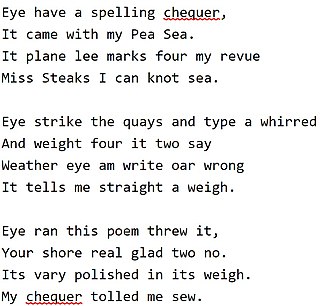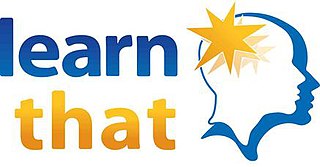Related Research Articles
Language education – the process and practice of teaching a second or foreign language – is primarily a branch of applied linguistics, but can be an interdisciplinary field. There are four main learning categories for language education: communicative competencies, proficiencies, cross-cultural experiences, and multiple literacies.
Computer-assisted language learning (CALL), British, or Computer-Aided Instruction (CAI)/Computer-Aided Language Instruction (CALI), American, is briefly defined in a seminal work by Levy as "the search for and study of applications of the computer in language teaching and learning". CALL embraces a wide range of information and communications technology applications and approaches to teaching and learning foreign languages, from the "traditional" drill-and-practice programs that characterised CALL in the 1960s and 1970s to more recent manifestations of CALL, e.g. as used in a virtual learning environment and Web-based distance learning. It also extends to the use of corpora and concordancers, interactive whiteboards, computer-mediated communication (CMC), language learning in virtual worlds, and mobile-assisted language learning (MALL).

English as a second or foreign language is the use of English by speakers with different native languages. Language education for people learning English may be known as English as a foreign language (EFL), English as a second language (ESL), English for speakers of other languages (ESOL), English as an additional language (EAL), or English as a New Language (ENL).

In software, a spell checker is a software feature that checks for misspellings in a text. Spell-checking features are often embedded in software or services, such as a word processor, email client, electronic dictionary, or search engine.
An interlanguage is an idiolect which has been developed by a learner of a second language (L2) which preserves some features of their first language (L1) and can overgeneralize some L2 writing and speaking rules. These two characteristics give an interlanguage its unique linguistic organization. It is idiosyncratically based on the learner's experiences with L2. An interlanguage can fossilize, or cease developing, in any of its developmental stages. It is claimed that several factors shape interlanguage rules, including L1 transfer, previous learning strategies, strategies of L2 acquisition, L2 communication strategies, and the overgeneralization of L2 language patterns.
Edu-Ware Services, Inc. was an educational and entertainment software publisher established in 1979 by Sherwin Steffin and Steven Pederson. It was known for its adventure games, role-playing video games, and flight simulators for the Apple II series of computers.
The Iowa Tests of Educational Development (ITED) are a set of standardized tests given annually to high school students in many schools in the United States, covering Grades 9 to 12. The tests were created by the University of Iowa's College of Education in 1942, as part of a program to develop a series of nationally accepted standardized achievement tests. The primary goal of the ITED is to provide information to assist educators in improving teaching.
Inventive spelling is the use of unconventional spellings of words.

Cambridge English: Young Learners, also known as Young Learners English Tests (YLE), is a suite of English language tests specially designed for children in primary and lower-secondary school. The tests are provided by Cambridge English Language Assessment.
The audio-lingual method or Army Method is a method used in teaching foreign languages. It is based on behaviorist theory, which postulates that certain traits of living things, and in this case humans, could be trained through a system of reinforcement. The correct use of a trait would receive positive feedback while incorrect use of that trait would receive negative feedback.
The Modern Language Aptitude Test (MLAT) was designed to predict a student's likelihood of success and ease in learning a foreign language. It is published by the Language Learning and Testing Foundation.
A foreign language writing aid is a computer program or any other instrument that assists a non-native language user in writing decently in their target language. Assistive operations can be classified into two categories: on-the-fly prompts and post-writing checks. Assisted aspects of writing include: lexical, syntactic, lexical semantic and idiomatic expression transfer, etc. Different types of foreign language writing aids include automated proofreading applications, text corpora, dictionaries, translation aids and orthography aids.
The Compu-Math series are mathematics tutorials developed and published by Edu-Ware Services in the 1980s. Each program in the Compu-Math series begins with a diagnostic Pre-Test, which presents learners with mathematics problems to determine their current skill level in the subject and then recommends the appropriate learning module. Each learning module begins by specifying the instructional objectives for that module and proceeds to teach those specific goals using shaping and cueing methods, and finishes by testing to verify that learners have indeed learned the skills being taught by the module.

Management of dyslexia depends on a multiple of variables; there is no one specific strategy or set of strategies that will work for all who have dyslexia.
Commonly misspelled English words are words that are often unintentionally misspelled in general writing. A selected list of common words is presented below, under Documented list of common misspellings. Although the word common is subjective depending on the situation, the focus is on general writing, rather than in a specific field. Accepted spellings also vary by country or region, with some rejecting the American or British variants as incorrect for the region.
Augmented learning is an on-demand learning technique where the environment adapts to the learner. By providing remediation on-demand, learners can gain greater understanding of a topic while stimulating discovery and learning.
Language pedagogy is the discipline concerned with the theories and techniques of teaching language. It has been described as a type of teaching wherein the teacher draws from their own prior knowledge and actual experience in teaching language. The approach is distinguished from research-based methodologies.
In linguistics, according to J. Richard et al., (2002), an error is the use of a word, speech act or grammatical items in such a way that it seems imperfect and significant of an incomplete learning (184). It is considered by Norrish as a systematic deviation which happens when a learner has not learnt something, and consistently gets it wrong. However, the attempts made to put the error into context have always gone hand in hand with either [language learning and second-language acquisition] processe, Hendrickson (1987:357) mentioned that errors are ‘signals’ that indicate an actual learning process taking place and that the learner has not yet mastered or shown a well-structured [linguistic competence|competence] in the target language.
Meaningful learning refers to the act of higher order thinking and development through intellectual engagement that uses pattern recognition and concept association. It can include—but is not limited to—critical and creative thinking, inquiry, problem solving, critical discourse, and metacognitive skills. The concept and theory of meaningful learning is that learned information is completely understood and can now be used to make connections with other previously known knowledge aiding in further understanding. Since information is stored in a network of connections, it can be accessed from multiple starting points depending on the context of recall. Meaningful learning is often contrasted with rote learning, a method in which information is memorized sometimes without elements of understanding or relation to other objects or situations. A real-world example of a concept the learner has learned is an instance of meaningful learning. Utilization of meaningful learning may trigger further learning, as the relation of a concept to a real-world situation may be encouraging to the learner. It may encourage the learner to understand the information presented and will assist with active learning techniques to aid their understanding. Although it takes longer than rote memorization information, it is typically retained for a longer period of time.

LearnThat Foundation is an American 501(c)3 nonprofit organization that develops and manages an online vocabulary and spelling program along with a free multimedia learners' dictionary, Open Dictionary of English (ODE). The foundation was founded in February 2004 under the name eSpindle Learning. In August 2010, the name was changed to LearnThat Foundation, and its domain was moved to www.LearnThat.org. The program is branded as LearnThatWord.
References
- Product Catalog. Edu-Ware Services. August 1, 1980.
- Tommervik, Allan (May 1981). "Exec Edu-Ware". Softalk: 4, 6, 19.